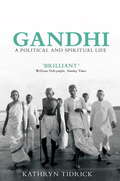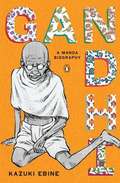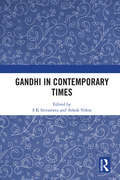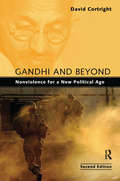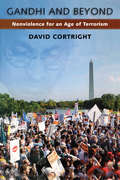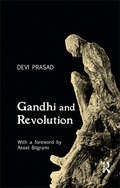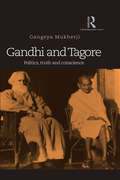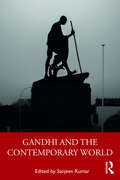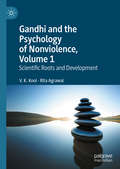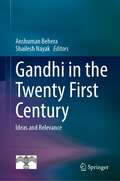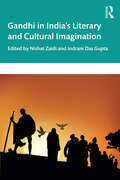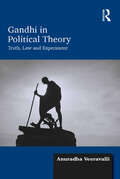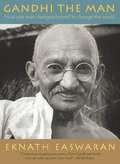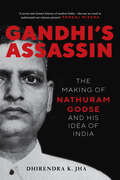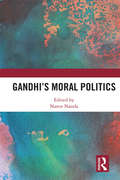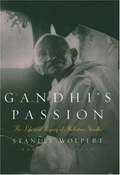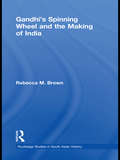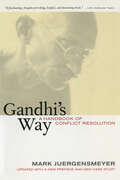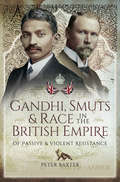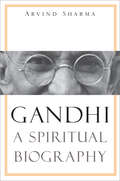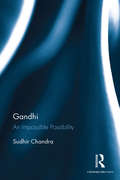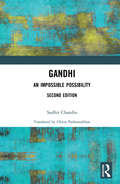- Table View
- List View
Gandhi
by Kathryn TidrickThroughout his long and turbulent career as a political leader, first in South Africa and then in India, Gandhi sought to fulfil his religious aspirations through politics and to reconcile politics with personal religious conviction. But Gandhi's religion was wildly divergent from anything to have taken root in his native India. Foremost among his private tenets was the belief that he was a world saviour, long prophesied and potentially divine. Penetrating and provocative, Kathryn Tidrick's book draws on neglected material to explore the paradoxes within Gandhi's life and personality. She reveals a man whose spiritual ideas originated not in India, but in the drawing rooms of late-Victorian England, and which included some very eccentric and damaging notions about sex. The resulting portrait is complex, convincing and, to anyone interested in the legacy of colonialism, more enlightening than any previously published. The Gandhi revealed here is not the secular saint of popular renown, but a difficult and self-obsessed man driven by a messianic sense of personal destiny. From the Trade Paperback edition.
Gandhi
by Kazuki EbineThe life of a true twentieth-century hero told in a vibrant graphic novel format. Through his quietly powerful leadership and influential use of nonviolent resistance in India's struggle against the British Raj, Mahatma Gandhi became one of the most revered figures of the modern era. While history has recorded Gandhi's words and deeds, the man himself has been eclipsed by maxims of virtuosity that seem to have little resonance in our everyday lives. In Gandhi, the third volume in our exciting new manga biography series, created in conjunction with Emotional Content, Kazuki Ebine combines a gripping narrative with stunning illustrations to share Gandhi's inspiring and deeply human story with a whole new generation of readers. Developed in conjunction with Emotional Content. .
Gandhi Aur Ambedkar: गांधी और आंबेडकर
by Ganesh Mantriगांधी और आंबेडकर पर अनेक छोटे-बडे़ अध्ययन हुए हैं; किंतु अस्पृश्यों की सामाजिक स्थिति में परिवर्तन की दृष्टि से उनके विचारों और कार्यों का अध्ययन आंशिक रूप से ही हुआ है। प्रस्तुत अध्ययन का उद्देश्य अस्पृश्यता के परिप्रेक्ष्य में गांधी और आंबेडकर का समग्र रूप से तुलनात्मक विवेचन करना है। इस पुस्तक में इन दोनों महान् व्यक्तियों के जीवन-संदर्भों; विचारधाराओं; स्वतंत्रता-संग्राम के समय की सामाजिक-राजनीतिक प्रक्रियाओं का विश्लेषण करते हुए; भारत की वर्तमान परिस्थितियों में दोनों के विचार और कर्म की भूमिका तथा दलितों की वर्तमान स्थिति में इनकी प्रासंगिकता की खोज की गई है।
Gandhi In Contemporary Times
by S K Srivastava Ashok VohraThis volume brings together essays which discuss and contextualise Gandhi’s ideas on pluralism, religious identity, non-violence, satyagraha, and modernity. It interrogates the epistemic foundations of Gandhian thinking and weltanschauung, identifies diverse strands within his arguments, and gives it new meaning in contemporary society. This book focuses on Gandhi’s engagements with religious, political and social conflicts, his reflections on faith and modernity, and his argumentative dialogues with Mohammad Ali Jinnah and B R Ambedkar. It provides critical insights into Gandhi’s philosophy and suggests ways of engaging with his ethical and moral ideas in contemporary intellectual and political discourse. Comparing and contrasting Gandhian thought and strategies with contemporary issues and conceptions of religious freedom, conflict resolution, and liberalism; the volume reformulates and reconstitutes his intellectual and political legacy. This book points to new and possible future directions of research on Gandhian concepts and will be useful for scholars in the fields of political science, Gandhian studies, sociology and philosophy.
Gandhi and Beyond: Nonviolence for a New Political Age
by David CortrightIs there room for nonviolence in a time of conflict and mass violence exacerbated by economic crisis? Drawing on the legend and lessons of Gandhi, Cortright traces the history of nonviolent social activism through the twentieth century to the civil rights movement, the Vietnam era, and up to the wars in Iraq, Afghanistan, and Gaza. Gandhi and Beyond offers a critical evaluation and refinement of Gandhi's message, laying the foundation for a renewed and deepened dedication to nonviolence as the universal path to social progress. In the second edition of this popular book, a new prologue and concluding chapter situate the message of nonviolence in recent events and document the effectiveness of nonviolent methods of political change. Cortright's poignant "Letter to a Palestinian Student" points toward a radical new strategy for achieving justice and peace in the Middle East. This book offers pathways of hope not only for a new American presidential administration but for the world.
Gandhi and Beyond: Nonviolence for an Age of Terrorism
by David Cortright"David Cortright is a life-long activist and respected scholar. In Gandhi and Beyond, he convincingly shows the power of nonviolence as a philosophy of life, not just a method of social action. His practical analysis of Gandhi, Martin Luther King, Dorothy Day, Cesar Chavez, and others brings new insights and inspiration to those of us attempting to live that philosophy, and to those, especially a new generation, who are seeking a better way to respond to their world. I commend this book to all who are seeking an alternative to violence." Jim Wallis, author of God's Politics and editor of Sojourners Is there room for nonviolence in an age of terrorism? Drawing on the legend and lessons of Gandhi, Cortright traces the history of nonviolent social activism through the early twentieth century to the civil rights movement, the Vietnam era, and up to the present war in Iraq. Gandhi and Beyond offers a critical evaluation and refinement of Gandhi's message, laying the foundation for a renewed and deepened dedication to nonviolence as the universal path to social progress and antidote to terrorism.
Gandhi and Marx
by K. G. MashruwalaWhat can be a more fascinating study to us in the present age than that of a comparison between the ideologies of Gandhi, the great soul (mahatma), and Marx, the great thinker (mahamuni)? If the last hundred years or so of the social life of humanity were boiled away, the residue will most likely be these two great names. Lenin is ingested in Marx. And the shadow of Tolstoy spreads over Gandhi. The two ideologies stand face to face, each bent on swallowing up the other. — VINOBA
Gandhi and Revolution
by Devi PrasadThis volume is a collection of Devi Prasad’s essays on Gandhi, social justice and social change. The different essays address themes ranging from Gandhi’s ideals of satyagraha and ahimsa, civil disobedience and non-violence, to the Gandhian approach to education as founded in making and crafting as well as participation in the political and social movements of our times. They also engage the revolutionary potential of Gandhi’s thought, drawing parallels between Lenin and Gandhi and analysing the historical significance of Gandhi’s anti-imperialist yet non-violent political philosophy. In sum, the volume dwells on the continuing, critical relevance of Gandhi in our times. It will be of interest to those in education, political science, peace and conflict studies, history and philosophy, as well as to the general reader interested in Gandhian thought.
Gandhi and Tagore: Politics, truth and conscience
by Gangeya MukherjiThis book brings together the political thought of Gandhi and Tagore to examine the relationship between politics, truth and conscience. It explores truth and conscience as viable public virtues with regard to two exemplars of ethical politics, addressing in turn the concerns of an evolving modern Indian political community. <P><P>The comprehensive and textually argued discussion frames the subject of the validity of ethical politics in inhospitable contexts such as the fanatically despotic state and energised nationalism. The book studies in nuanced detail Tagore’s opposition to political violence in colonial Bengal, the scope of non-violence and satyagraha as recommended by Gandhi to Jews in Nazi Germany, his response to the complexity of protest against the Jallianwala Bagh massacre, and the differently constituted nationalism of Gandhi and Tagore. It presents their famous debate in a new light, embedded within the dynamics of cultural identification, political praxis and the capacity of a community to imbibe the principles of ethical politics. Comprehensive and perceptive in analysis, this book will be a valuable addition for scholars and researchers of political science with specialisation in Indian political thought, philosophy and history. <P><P>Gangeya Mukherji is Reader in English at Mahamati Prannath Mahavidyalaya, Mau-Chitrakoot, Uttar Pradesh, India.
Gandhi and the Contemporary World
by Sanjeev KumarThis book develops a critical understanding of Mahatma Gandhi’s philosophy and practice in the context of contemporary challenges and engages with some of his key work and ideas. It highlights the relevance of Gandhi’s legacy in the quest towards peace-building, equity and global justice. The volume examines diverse facets of Gandhi’s holistic view of human life – social, economic and political – for the creation of a just society. Bringing together expert analyses and reflections, the chapters here emphasise the philosophical and practical urgency of Gandhi's thought and action. They explore the significance of his concepts of truth and nonviolence to address moral, spiritual and ethical issues, growing intolerance, conflict and violence, poverty and hunger, and environmental crisis for the present world. The volume serves as a platform for constructive dialogue for academics, researchers, policymakers and students to re-imagine Gandhi and his moral and political principles. It will be of great interest to those in philosophy, political studies, Gandhi studies, history, cultural studies, peace studies and sociology.
Gandhi and the Psychology of Nonviolence, Volume 1: Scientific Roots and Development
by Rita Agrawal V. K. KoolThe first of two volumes, this book examines Gandhi’s contribution to an understanding of the scientific and evolutionary basis of the psychology of nonviolence, through the lens of contemporary researches on human cognition, empathy, morality and self-control.While, psychological science has focused on those participants that delivered electric shocks in Professor Stanley Milgram’s famous experiments, these books begin from the premise that we have neglected to fully explore why the other participants walked away. Building on emergent research in the psychology of self control and wisdom, the authors illustrate what Gandhi’s life and work offers to our understanding of these subjects who disobeyed and defied Milgram.The authors analyze Gandhi’s actions and philosophy, as well as original interviews with his contemporaries, to elaborate a modern scientific psychology of nonviolence from the principles he enunciated and which were followed so successfully in his Satyagrahas. Gandhi, they argue, was a practical psychologist from whom we can derive a science of nonviolence which, as Volume 2 will illustrate, can be applied to almost every subfield of psychology, but particularly to those addressing the most urgent issues of the 21st century. This book is the result of four decades of collaborative work between the authors. It marks a unique contribution to studies of both Gandhi and the current trends in psychological research that will appeal in particular to scholars of social change, peace studies and peace psychology, and, serve as an exemplar in teaching one of modern psychology’s hitherto neglected perspectives.
Gandhi in the Twenty First Century: Ideas and Relevance
by Shailesh Nayak Anshuman BeheraThis book engages a multidisciplinary approach to understand Gandhi in addressing specific contemporary societal issues. The issues highlighted in the book through thirteen distinct, yet interrelated, themes offer solutions to the societal challenges through the prism of Gandhian thought process. This edited book explores how ideas Gandhi expressed over a century ago can be applied today to issues from the UN's Sustainable Development Goals to peaceful resolution of conflicts. In particular, it looks at the contemporary societies' critical issues and offers solutions through the prism of Gandhian ideas. Written in an accessible style, this book reintroduces Gandhi to today's audiences in relevant terms.
Gandhi in India’s Literary and Cultural Imagination
by Nishat Zaidi Indrani Das GuptaThis book engages with the socio-cultural imaginings of Gandhi in literature, history, visual and popular culture. It explores multiple iterations of his ideas, myths and philosophies, which have inspired the work of filmmakers, playwrights, cartoonists and artists for generations. Gandhi’s politics of non-violent resistance and satyagraha inspired various political leaders, activists and movements and has been a subject of rigorous scholarly enquiry and theoretical debates across the globe. Using diverse resources like novels, autobiographies, non-fictional writings, comic books, memes, cartoons and cinema, this book traces the pervasiveness of the idea of Gandhi which has been both idolized and lampooned. It explores his political ideas on themes such as modernity and secularism, environmentalism, abstinence, self-sacrifice and political freedom along with their diverse interpretations, caricatures, criticisms and appropriations to arrive at an understanding of history, culture and society. With contributions from scholars with diverse research interests, this book will be an essential read for students and researchers of political philosophy, cultural studies, literature, Gandhi and peace studies, political science and sociology.
Gandhi in Political Theory: Truth, Law and Experiment
by Anuradha VeeravalliCan Gandhi be considered a systematic thinker? While the significance of Gandhi’s thought and life to our times is undeniable it is widely assumed that he did not serve any discipline and cannot be considered a systematic thinker. Despite an overwhelming body of scholarship and literature on his life and thought the presuppositions of Gandhi’s experiments, the systematic nature of his intervention in modern political theory and his method have not previously received sustained attention. Addressing this lacuna, the book contends that Gandhi’s critique of modern civilization, the presuppositions of post-Enlightenment political theory and their epistemological and metaphysical foundations is both comprehensive and systematic. Gandhi’s experiments with truth in the political arena during the Indian Independence movement are studied from the point of view of his conscious engagement with method and theory rather than merely as a personal creed, spiritual position or moral commitment. The author shows how Gandhi’s experiments are illustrative of his theoretical position, and how they form the basis of his opposition to the foundations of modern western political theory and the presuppositions of the modern nation state besides envisioning the foundations of an alternative modernity for India, and by its example, for the world.
Gandhi the Man
by Eknath EaswaranThis is the moving story of a nonviolent hero, illustrated with more than 70 photographs, and told by a highly respected author who grew up in Gandhi's India.Gandhi's life continues to inspire and baffle readers today. How did an unsuccessful young lawyer become the Mahatma, the "great soul" who led 400 million Indians in their struggle for independence from the British Empire? What is nonviolence, and how does it work?Easwaran answers these questions and gives a vivid account of the turning points and choices in Gandhi's life that made him an icon of nonviolence. Easwaran witnessed at firsthand how Gandhi inspired ordinary people to turn fear into fearlessness, and anger into love. He visited Gandhi in his ashram to find out more about this human alchemy, and during the prayer meeting watched the Mahatma absorbed in meditation on the Bhagavad Gita, the scripture that was the wellspring of his spiritual power.Quotations highlight Gandhi's teachings in his own words, and sidebar notes and a chronology, new to this updated edition, provide historical context.This book conveys the spirit and soul of Gandhi - the only way he can be truly understood.
Gandhi's Assassin: The Making of Nathuram Godse and His Idea of India
by DHIRENDRA JHAThe life of Nathuram Godse, the man who shot GandhiDhirendra Jha's deeply researched history places Nathuram Godse's life as the juncture of the dangerous fault lines in contemporary India: the quest for independence and the rise of Hindu nationalism.On a wintry Delhi evening on 30 January 1948, Nathuram Godse shot Gandhi at point-blank range, forever silencing the man who had delivered independence to his nation. Godse&’s journey to this moment of international notoriety from small towns in western India is, by turns, both riveting and wrenching. Drawing from previously unpublished archival material, Jha challenges the standard account of Gandhi&’s assassination, and offers a stunning view on the making of independent India.Born to Brahmin parents, Godse started off as a child mystic. However, success eluded him. The caste system placed him at the top of society but the turbulent times meant that he soon became a disaffected youth, desperately seeking a position in the infant nation.In such confusing times, Godse was one of hundreds, and later thousands, of young Indian men to be steered into the sheltering fold of early Hindutva, Indian nationalism. His association with early formations of the RSS and far-right thinkers such as Sarvakar proves that he was not working alone. Today he is considered to be a patriotic hero by many for his act of bravery, despite being found guilty in court and executed in 1949.
Gandhi's Moral Politics
by Naren NandaThis volume explores the scope and limits of Mahatma Gandhi's moral politics and its implications for Indian and other freedom movements. It presents a set of enlightening essays based on lectures delivered in memory of the eminent historian B. R. Nanda along with a new introductory essay. With contributions by leading historians and Gandhi scholars, the book provides new perspectives on the limits of Gandhi’s moral reasoning, his role in the choice of destination by Indian Muslim refugees, his waning influence over political events, and his predicament amid the violence and turmoil in the years immediately preceding partition. The work brings together wide-ranging insights on Gandhi and revisits his religious views, which were the foundation of his morality in politics; his experience of civil disobedience and its nature, deployment and limits; Satyagraha and non-violence; and his struggle for civil rights. The volume also examines how Gandhi’s South African phase contributed to his later ideas on private property and self-sacrifice. This book will be of immense interest to researchers and scholars of modern Indian history, Gandhi studies, political science, peace and conflict studies, South Asian studies; to researchers and scholars of media and journalism; and to the informed general reader.
Gandhi's Passion: The Life and Legacy of Mahatma Gandhi
by Stanley WolpertMahatma Gandhi, through his indomitable will and selfless determination, transformed himself into a model of courage and integrity for India's people to emulate in their nonviolent struggle for political power. More than half a century after his death, Gandhi continues to inspire millions throughout the world. Yet modern India seems to have abandoned much of his nonviolent vision, joining the nuclear arms race. Inspired by recent events in India, Stanley Wolpert offers this subtle and profound biography of India's "Great Soul". Wolpert compellingly chronicles the life of Mahatma Gandhi from his early days as a child of privilege to his humble rise to power and his assassination at the hands of a man of his own faith. This trajectory, like that of Christ, was the result of Gandhi's passion: his conscious courting of suffering as the means of reaching divine truth. From his early campaigns to end discrimination in South Africa to his leadership of a people's revolution to end the British imperial domination of India, Gandhi emerges as a man of inner conflicts conquered by his political genius and moral vision. The sweet reasonableness of his "Great Soul", combined with the steel of his unyielding opposition to intolerance and oppression, would inspire India like no leader since the Buddha -- creating a legacy that would encourage Martin Luther King, Jr., Nelson Mandela, and other global leaders to demand a better world through peaceful civil disobedience.
Gandhi's Spinning Wheel and the Making of India (Routledge Studies in South Asian History)
by Rebecca BrownGandhi’s use of the spinning wheel was one of the most significant unifying elements of the nationalist movement in India. Spinning was seen as an economic and political activity that could bring together the diverse population of South Asia, and allow the formerly elite nationalist movement to connect to the broader Indian population. This book looks at the politics of spinning both as a visual symbol and as a symbolic practice. It traces the genealogy of spinning from its early colonial manifestations in Company painting to its appropriation by the anti-colonial movement. This complex of visual imagery and performative ritual had the potential to overcome labour, gender, and religious divisions and thereby produce an accessible and effective symbol for the Gandhian anti-colonial movement. By thoroughly examining all aspects of this symbol’s deployment, this book unpacks the politics of the spinning wheel and provides a model for the analysis of political symbols elsewhere. It also probes the successes of India’s particular anti-colonial movement, making an invaluable contribution to studies in social and cultural history, as well as South Asian Studies.
Gandhi's Way: A Handbook of Conflict Resolution
by Mark JuergensmeyerGandhi’s Way provides a primer of Mahatma Gandhi’s principles of moral action and conflict resolution and offers a straightforward, step-by-step approach that can be used in any conflict—-at home or in business; in local, national, or international arenas. This invaluable handbook, updated with a new preface and a new case study on terrorism in Northern Ireland, sets out Gandhi’s basic methods and illustrates them with practical examples. Juergensmeyer shows how parties at odds can rise above a narrow view of self-interest to find resolutions that are satisfying and beneficial to all involved. He then pits Gandhi’s ideas against those of other great social thinkers in a series of imaginary debates that challenge and clarify Gandhi’s thinking on issues of violence, anger, and love. He also provides a Gandhian critique of Gandhi himself and offers viable solutions to some of the gaps in Gandhian theory. Gandhi’s Way: A Handbook of Conflict Resolution was previously published as Fighting with Gandhi and Fighting Fair.
Gandhi, Smuts & Race in the British Empire: Of Passive & Violent Resistance
by Peter BaxterTowards the end of 1906, a meeting took place between two emerging giants of the age, Mohandas K. Gandhi and General Jan Christian Smuts. United under the same empire, but separated by distance and culture, Smuts was born in the Cape Colony, and Gandhi in Porbandar, a duchy of the Indian province of Gujarat. Both, however, went on to study law in Britain, and while developing a great admiration for the institutions of empire, each man also suffered his own particular crisis of faith. From their widely dispersed origins, Gandhi and Smuts collided over the issue of race and equality in a turbulent province of the empire, each attempting to hold the British to their stated ideals. This insightful book explores attitudes to race, and belonging, in an age when the English speaking peoples straddled the globe, and sought to impose on all of their subject races, basking under the radiance of Britannia, a common ideal of parity, equal opportunity and free movement.
Gandhi: 'Hind Swaraj' and Other Writings
by Anthony J. ParelHind Swaraj is Mahatma Gandhi's fundamental work. Not only is it key to understanding his life and thoughts, but also the politics of South Asia in the first half of the twentieth century. Celebrating 100 years since Hind Swaraj was first published in a newspaper, this centenary edition includes a new preface and editor's introduction, as well as a new chapter on 'Gandhi and the 'Canonical aims of life''. The volume presents a critical edition of the 1910 text of Hind Swaraj, fully annotated and including Gandhi's own Preface and Foreword (not found in other editions). Anthony J. Parel sets the work in its historical and political contexts and analyses the significance of Gandhi's experiences in England and South Africa. The second part of the volume contains some of Gandhi's other writings, including his correspondence with Tolstoy and Nehru.
Gandhi: A Spiritual Biography
by Arvind SharmaIn his Autobiography, Gandhi wrote, "What I want to achieve--what I have been striving and pining to achieve these thirty years--is self-realization, to see God face to face. . . . All that I do by way of speaking and writing, and all my ventures in the political field, are directed to this same end." While hundreds of biographies and histories have been written about Gandhi (1869-1948), nearly all of them have focused on the political, social, or familial dimensions of his life. Very few, in recounting how Gandhi led his country to political freedom, have viewed his struggle primarily as a search for spiritual liberation.Shifting the focus to the understudied subject of Gandhi's spiritual life, Arvind Sharma retells the story of Gandhi's life through this lens. Illuminating unsuspected dimensions of Gandhi's inner world and uncovering their surprising connections with his outward actions, Sharma explores the eclectic religious atmosphere in which Gandhi was raised, his belief in reincarnation, his conviction that morality and religion are synonymous, his attitudes toward tyranny and freedom, and, perhaps most important, the mysterious source of his power to establish new norms of human conduct. This book enlarges our understanding of one of history's most profoundly influential figures, a man whose trust in the power of the soul helped liberate millions.
Gandhi: An Impossible Possibility
by Sudhir ChandraFor a man who made such a powerful intervention in the history of the 20th century, many of Mahatma Gandhi’s ideas were misunderstood or obfuscated during his lifetime. This book draws our attention to Gandhi’s last years, particularly the marked change in his understanding of the acceptance of non-violence by Indians. It points to a startling discovery Gandhi made in the years preceding India’s Independence and Partition: the struggle for freedom which he had all along believed to be non-violent was in fact not so. He realised that there was a causal relationship between the path of illusory ahimsa which had held sway during the freedom struggle and the violence that erupted thereafter during Partition. Calling for a serious rethink on the very nature and foundation of modern India, this book throws new light on Gandhian philosophy and its far-reaching implications for the world today. It will interest not only scholars and researchers of modern Indian history, politics, and philosophy but also lay readers.
Gandhi: An Impossible Possibility
by Sudhir ChandraGandhi was perhaps the most influential yet misunderstood figure of the twentieth century. Drawing close attention to his last years, this book explores the marked change in his understanding of the acceptance of non-violence by Indians. It points to a startling discovery Gandhi made in the years preceding India’s Independence and Partition: the struggle for freedom which he had all along believed to be non-violent was in fact not so. He realised that there was a causal relationship between the path of illusory ahimsa, which had held sway during the freedom struggle, and the violence that erupted thereafter during Partition. In the second edition of this much-acclaimed volume, Chandra revisits Gandhi’s philosophy to explain how and why the phenomenon of the Mahatma has been understood and misunderstood through the years. Calling for a rethink of the very nature and foundation of modern India, this book throws new light on Gandhian philosophy and its far-reaching implications for the world today. It will interest not only scholars and researchers of modern Indian history, politics and philosophy, but also lay readers.
